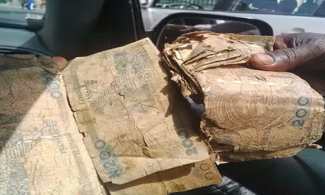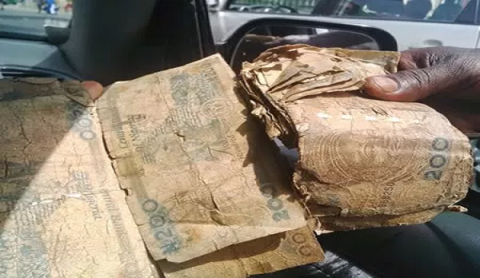
A laboratory assay carried out on randomly obtained N100 notes showed the presence of pathogenic and nonpathogenic bacteria colonies like bacillus, staphylococcus aureus and candida. The examination also showed high presence of germs.

There has been growing concern over dirty and mutilated Naira notes — particularly the N100 note — in circulation. While one can easily guess the presence of germs from the dingy state of these paper notes, SaharaReporters can categorically confirm that some of the currencies in circulation carry pathogenic microorganisms like staphylococcus aureus and candida.
A laboratory assay carried out on randomly-obtained N100 notes showed the presence of pathogenic and nonpathogenic bacteria colonies like bacillus, staphylococcus aureus and candida. The examination also showed high presence of germs.
Larger species of Bacillus, an aerobic spore forming rods that stain gram positive or gram variable; and Candida, a genus of yeasts, have no pathogenic potential but if in contact with a person with low immune system, they can cause serious ailment. For instance, tuberculosis is caused by a species of Bacillus microorganism, while Candidiasis is caused by Candida species.
Staphylococcus aureus, on the other hand, is one of the more serious disease-causing bacteria in humans. According to Minnesota Department of Health Fact Sheet, it is the leading cause of skin and soft tissue infections such as abscesses (boils), furuncles, and cellulitis. Staphylococcus aureus also causes infections in the bloodstream, pneumonia, or bone and joint infections.
The bacteria and fungi, according to the analyst who carried out the analysis, are transmitted onto the notes through contacts with human carriers.
However, Adeoye Joshua, a Harvard University-trained doctor, while giving his expert opinion on the implication of bacteria on naira notes, said it is unlikely that the amount of bacteria on the notes can cause infection.
He said: “The amount of bacteria matters when it comes to infection. We are not sure whether this amount is infective but what we know is that it can carry it.
“For an immune compromised person; for instance, someone who is using long term corticosteroid, maybe the person has cancer or the person has an implant or the person has HIV or the person has a disease in which white blood cells are not functioning well, it means that even touching a naira note could be dangerous.
“There are different diseases that come from Bacillus species; for example you can have tuberculosis. However, it is the exact specie that tells you the exact it will cause. So, when they say Bacillus species, it is not specific enough for one to say which but that Bacillus tells you that tuberculosis is spreadable from that. This is not hard to envisage; when you cough into your hands and hold the money.”
CBN Last Printed N100 In 2014
SaharaReporters found out that the last set of N100 notes were printed in 2014. This could explain why there are many mutilated N100 notes in circulation.
The Nigerian Security Printing and Minting PLC, company responsible for printing money and other sensitive materials for the Nigerian government, refused to verify the observation. The public relations office directed our correspondent the Central Bank of Nigeria (CBN).
“Your inquiries should be directed to the CBN not the mint. We do not have the legal right to give you such information. We are contractors to the CBN; we cannot talk about our customers’ products,” the official said.
When contacted, spokesperson to the CBN, Isaac Okarafor, frustrated all attempts to get the apex bank’s comment. He declined to give a comment when called, insisting rather that a text be sent to him but he also did not respond to the text messages.
Nonetheless, multiple officials from banks who spoke with SaharaReporters confirmed that CBN has not printed new N100 notes in four years. “The last time N100 was printed was during the centenary celebration,” said one of the staffers of a new generation bank.
Some months ago, Okarafor, in a tweet, blamed commercial banks for the mutilated notes.
He said:"Lower denomination notes have greater velocity of circulation, meaning they are frequently in use and get abused. Several factors account for the existence of worn out notes: The abuse mentioned above and the attitude of banks who fail to return them for reissue is another.
"To solve this problem, the CBN opened a window for banks to return N50 to N5 denominations for processing at N1000/box instead of N12,000 per box, between January 2 and March 28, 2018. The waiver in processing is to encourage banks to return unfit notes for reissue."
However, this excuse does not explain why dirty N100 notes remain in circulation, despite complaints and the directive from the House of Representatives.
Following a motion by Honourable Adekoya Abdel-Majid, a lawmaker from Ogun State, asking the house to mandate CBN to withdraw dirty naira notes from circulation, the lawmakers had unanimously resolved that old notes should be taken out of circulation.
While explaining his motion, Abdel-Majid said: “Considering that bacteria naturally breed and live in dirty environments and objects, dirty naira notes could pose serious health risks as they have been found to contain pathogenic parasites and bacteria. These notes could be sources of infection as well as potential carriers of communicable diseases. When they (the naira notes) stay longer in circulation, they gather dirt from one hand to the other.”
However, while there are newer mints of the lower denomination—N50 - N5—the apex bank has refused to give reason dirty N100 notes are still moving from store to store and hands to hands, and why it has not printed new ones since 2014.
Protect Yourself, Always Wash Your Hands
With the silence of CBN as germs and bacteria-filled N100 notes travel round the country, the only way Nigerians can protect themselves from infections that could be caused by these pathogens is to constantly wash their hands, Ugochi Obidiegwu, a safety professional told SaharaReporters.
She said: “I think that something needs to be done urgently about this. It does not represent our country properly. It does not encourage a receiver to collect. It could abhor germs. They might forget and use those same hands to eat or take medication, inadvertently putting them in harm’s way. I know sometimes people say ‘Dirty no dey kill African man’, but I beg to differ. Everyone needs to be careful and take extra precaution when handling those notes.
“Citizens should become more proactive about this by indulging in frequent hand washing. It is also important to have a handy sanitizer and wet wipes to keep the hands clean, if water is not close by. When in doubt, I'd say do not collect that particular note; seek alternatives.”